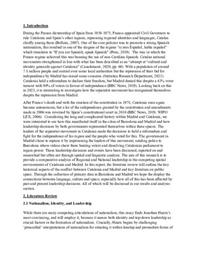Leadership In Action: Bridging the Knowledge to Action gap with King's Health Partners
The six weeks I spent with King’s Health Partners for my Leadership in Action project was a valuable experience. I learnt about the multi-faceted nature of leadership, within a healthcare context. Leadership is defined as ‘the action of leading a group of people or an organisation.’ By interning with the Institute of Women and Children’s Health, I was able to see and practice this definition. I was lucky enough to be under the supervision of Dr Ingrid Wolfe and Dr Nandi Simpson, the Director, and Associate Director of the Institute. It was amazing to see them at work, their creativity and leadership was inspiring. From them, I learnt more about how to operate within a workspace and how to work efficiently and effectively. I was further exposed to impressive people through the various interviews conducted during the internship. These interviews ranged from research fellows and analysts, programme managers, and a director of communications. It was amazing to learn the importance of leadership in these roles. An important lesson I learnt about leadership is that it is never solitary, it is a collaborative effort which requires diverse skills. These diverse skills include communication, perseverance, and empathy.
So, I was able to develop and practice some leadership skills such as organisation and determination. My fellow intern and I tackled this project by delegating and planning tasks each week. This helped to break down the project into manageable sections. We had meetings at the beginning and end of the week to ensure we understood our work and compose weekly updates for our supervisors. By keeping open communication, this allowed us to successfully complete our work in a timely manner and to a high quality. Ultimately, all our work went to developing a business proposal for our project. Our project was to determine how to increase knowledge to action in healthcare, with specific focus on women and children’s health. This was an interesting project as the knowledge translation system is a complex, multi-dimensional idea. New knowledge which can improve the quality of healthcare is often slow to be implemented. Therefore, it is necessary to reduce the gap between knowledge to policy, but with additional emphasis on the actual practice of this policy. Our proposal outlined how a think tank would help to close this gap as it would act as a knowledge broker for policy makers and researchers. This proposal was constructed by in depth research, interviews, and feedback from industry professionals. An important skill a leader requires is the ability to listen and learn. I was able to develop this skill during the internship. About three weeks into the internship, we had a feedback meeting with researchers, public servants, and project managers from IWCH. We presented our initial, which defined what a think tank was and how it operates, the funding models that it could establish, and why it was necessary to tackle the knowledge to action gap. We received constructive criticism and compliments on our work. This was encouraging as it allowed us to refine and improve our understanding of the project. It also enabled us to make better decisions moving forward, to focus our energy into areas of research which were relevant and important. This meeting allowed us to become more focused and effective.
Overall, this internship was an incredible experience. I discovered the complexity of policy making in healthcare and I developed my leadership skills. I was able to produce a business proposal which aimed to improve the quality of healthcare for women and children. This was, and is, so important as women and children are the future of society, the life force which enables society to keep developing and growing. I am grateful for this unique and impactful experience.

Please sign in
If you are a registered user on Laidlaw Scholars Network, please sign in